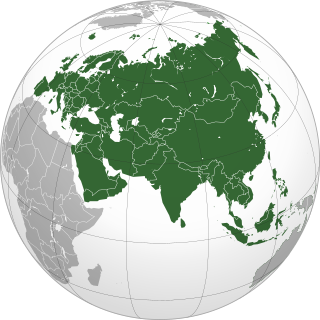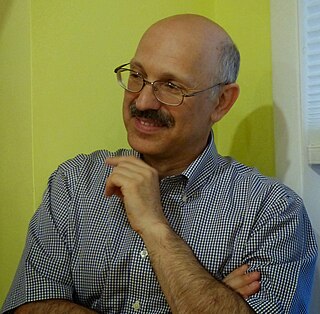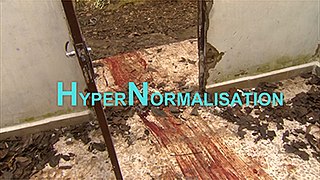Это было навсегда, пока не кончилось. Последнее советское поколение (in Russian). Moscow: New Literary Observer. 2014. ISBN 978-5-4448-0361-5.
Popular Culture
Science fiction authors and brothers Arkady and Boris Strugatsky described the reality Alexei Yurchak would later coin as hypernormalisation in their 1971 novel Roadside Picnic. This book was the base for the Russian movie "Stalker (1979) ".
HyperNormalisation is a 2016 BBC documentary by British filmmaker Adam Curtis that popularised the term hypernormalisation.
Related Research Articles

Russians are an East Slavic ethnic group native to Eastern Europe. Their mother tongue is Russian, the most spoken Slavic language. The majority of Russians adhere to Orthodox Christianity, ever since the Middle Ages. By total numbers, they are the largest Slavic and European nation.
Slavic or Slavonicstudies, also known as Slavistics, is the academic field of area studies concerned with Slavic peoples, languages, literature, history, and culture. Originally, a Slavist or Slavicist was primarily a linguist or philologist researching Slavistics. Increasingly, historians, social scientists, and other humanists who study Slavic cultures and societies have been included in this rubric.
Homo Sovieticus is a pejorative term coined to describe the average conformist individual in the Soviet Union and other Eastern Bloc countries. Popularized by Soviet writer Aleksandr Zinovyev, it gained negative connotations and represented the perceived outcome of Soviet policies.

The Association for Slavic, East European, and Eurasian Studies (ASEEES) is a scholarly society "dedicated to advancing knowledge about Central Asia, the Caucasus, Russia, and Eastern Europe in regional and global contexts." The ASEEES supports teaching, research, and publication relating to the peoples and territories within this area.
John R. Lampe is an American educator. He is a professor of history at the University of Maryland.

Ronald Grigor Suny is an American-Armenian historian and political scientist. Suny is the William H. Sewell Jr. Distinguished University Professor of History Emeritus at the University of Michigan and served as director of the Eisenberg Institute for Historical Studies, 2009 to 2012 and was the Charles Tilly Collegiate Professor of Social and Political History at the University of Michigan from 2005 to 2015, William H. Sewell Jr. Distinguished University Professor of History (2015–2022), and is Emeritus Professor of political science and history at the University of Chicago.
Wayne S. Vucinich was an American historian. Following World War II, he was one of the founders of Russian, Slavic, East European and Byzantine studies at Stanford University, where he spent his entire academic career.

Eurasia is the largest continental area on Earth, comprising all of Europe and Asia. According to some geographers, physiographically, Eurasia is a single supercontinent. The concepts of Europe and Asia as distinct continents date back to antiquity, but their borders have historically been subject to change. For example, to the ancient Greeks, Asia originally included Africa but they classified Europe as separate land. Eurasia is connected to Africa at the Suez Canal, and the two are sometimes combined to describe the largest contiguous landmass on Earth, Afro-Eurasia.

Kristen Rogheh Ghodsee is an American ethnographer and Professor of Russian and East European Studies at the University of Pennsylvania. She is primarily known for her ethnographic work on post-Communist Bulgaria as well as being a contributor to the field of postsocialist gender studies. She was critical of the role of Western feminist nongovernmental organizations doing work among East European women in the 1990s. She has also examined the shifting gender relations of Muslim minorities after Communist rule, the intersections of Islamic beliefs and practices with the ideological remains of Marxism–Leninism, communist nostalgia, the legacies of Marxist feminism, and the intellectual history of utopianism.

Ribs, also known as music on ribs, jazz on bones, bones or bone music (roentgenizdat), are improvised gramophone recordings made from X-ray films. Mostly made through the 1950s and 1960s, ribs were a black market method of smuggling in and distributing music that was banned from broadcast in the Soviet Union. Banned artists included emigre musicians, such as Pyotr Leshchenko and Alexander Vertinsky, and Western artists, such as Elvis, the Beatles, the Rolling Stones, the Beach Boys, Ella Fitzgerald and Chubby Checker.
Kate Brown is a Professor of Science, Technology and Society at Massachusetts Institute of Technology. She is the author of Manual for Survival: A Chernobyl Guide to the Future (2019), Dispatches from Dystopia (2015), Plutopia (2013), and A Biography of No Place (2004). She was a member of the faculty at the University of Maryland, Baltimore County (UMBC) from 2000 to 2018. She is the founding consulting editor of History Unclassified in the American Historical Review.

Vyacheslav (Slava) Alexandrovich Gerovitch is an American historian of science of Russian origin, considered a leading scholar on Soviet space program history in the US and Cybernetics in the Soviet Union.

HyperNormalisation is a 2016 BBC documentary by British filmmaker Adam Curtis. It argues that following the global economic crises of the 1970s, governments, financiers and technological utopians gave up on trying to shape the complex "real world" and instead established a simpler "fake world" for the benefit of multi-national corporations that is kept stable by neoliberal governments. The film was released on 16 October 2016 on BBC iPlayer.
Dorothy Grace Atkinson was an American historian who specialized in Russian history.
Alexander S. Vucinich was an American historian. He taught at the department of history and sociology of science at the University of Pennsylvania from 1976 until his retirement in 1985. He also taught at San Jose State College (1950–64), the University of Illinois (1964–70), and the University of Texas (1970–76). After his retirement he and his wife Dorothy moved to Berkeley, California, where he participated in the activities of Berkeley's Institute of Slavic, East European, and Eurasian Studies. His field of research was the history of science and social thought in Russia and the Soviet Union.

Beth Holmgren is an American literary critic and a cultural historian in Polish and Russian studies. She is Professor and Chair of the Department of Slavic and Eurasian Studies at Duke University. Recognised for her scholarship in Russian women's studies and Polish cultural history, she is as of July 2018 working on a multicultural history of fin-de-siecle Warsaw. Before coming to Duke, she taught at the University of California-San Diego (1987-1993) and the University of North Carolina at Chapel Hill (1993-2007). She earned her B.A at Grinnell College, and two master's degrees and and her doctoral doctorate at Harvard University.
Adeeb Khalid is associate professor and Jane and Raphael Bernstein Professor of Asian Studies and History in the history department of Carleton College in Northfield, Minnesota. His academic contributions are highly cited.
Francine Hirsch is an American historian, specializing in modern Europe with a focus on Russia and the Soviet Union. She is a recipient of the Herbert Baxter Adams Prize for her book, Empire of Nations: Ethnographic Knowledge and the Making of the Soviet Union, as well as honors from the American Society of International Law, the Council of European Studies, and the Association for Slavic, East European, and Eurasian Studies for her work.
Lewis H. Siegelbaum is Jack and Margaret Sweet Professor Emeritus of History at Michigan State University. His interests include 20th century Europe, Russia and Soviet Union. He has been with MSU since 1983.
Katerina Clark was an Australian scholar of Soviet studies. After getting her postgraduate degrees at Australian National University and Yale University, she began working as a professor of Russian and Slavic studies, including at Yale. As an academic, she wrote several books: The Soviet Novel (1981); Mikhail Bakhtin (1986), which she wrote with her husband Michael Holquist; Petersburg: Crucible of Cultural Revolution (1998); Moscow, the Fourth Rome (2011); and Eurasia without Borders (2021).
References
- 1 2 "Alexei Yurchak | Anthropology". anthropology.berkeley.edu. University of California, Berkeley . Retrieved 9 July 2023.
- ↑ "Yurchak, Alexei, 1960-". Library of Congress Authorities. Retrieved 9 July 2023.
- ↑ Как говорить об обвале СССР? Кирилл Кобрин, Ирина Прохорова, Алексей Юрчак (in Russian). Smena Center of Contemporary Culture. 30 June 2016. Event occurs at 4:17–4:41. Retrieved 9 July 2023– via YouTube.
- ↑ "Alexei Yurchak, Ph.D. 1997 | Cultural Anthropology". culturalanthropology.duke.edu. Duke University . Retrieved 9 July 2023.
- ↑ Harris, Brandon (3 November 2016). "Adam Curtis's Essential Counterhistories". The New Yorker . Retrieved 3 November 2016.
- ↑ "Past Winners of the ASEEES Vucinich Book Prize". aseees.org. Association for Slavic, East European, and Eurasian Studies . Retrieved 9 July 2023.
- ↑ "Объявлены лауреаты премии "Просветитель"-2015. Дмитрий Зимин подтвердил проведение премии в 2016 году". premiaprosvetitel.ru (in Russian). 19 November 2015. Archived from the original on 4 January 2016. Retrieved 9 July 2023.
Alexei Yurchak | |
|---|---|
Алексей Владимирович Юрчак | |
| Born | Alexei Vladimirovich Yurchak 21 July 1960 |
| Academic background | |
| Education | Duke University |
| International | |
|---|---|
| National | |
| Academics | |
| Other | |